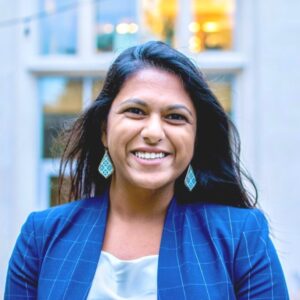By Basundhara Mukherjee ’24
Via LSC Blog

What leads a non-veteran to spend a year with the Veterans Legal Clinic? When I decided to enroll in the clinic during my 3L fall, I knew two things. First, I wanted practical experience diving into complex, diverse, and somewhat government-related legal issues. Second, I was eager to find community outside of the Cambridge classroom in my final year of school.
But when it came to veteran-related law, the list of what I didn’t know was far longer. What was a military discharge? How did one re-enlist? Where would I even begin with the maze of local, state, and federal veterans’ benefits?
My year at the Veterans Justice Project helped me answer these unknowns and far more. I had also, perhaps unintentionally, taken my early goal of litigating government-related issues to its extreme. By the end of the year, I had represented clients before nearly every level of government. I filed a brief at the Federal Circuit, negotiated a settlement with the Department of Veterans Affairs, argued an appeal at the Massachusetts Executive Office of Veterans Services, and pursued class certification on behalf of Massachusetts veterans against the state.
LSC quickly transformed into the brightest and most challenging experience of my law school career. My clinical work gave meaning to the doctrinal lessons back in the Cambridge classrooms. But my most significant learnings concerned the soft skills of lawyering. Many of my clients’ legal challenges required navigating the complex bureaucracy and politics of government. Traversing small–town politics with respect to a client’s benefits administration mattered just as much as understanding federal and state discourse on veterans’ benefits. Sometimes this required relying on non-litigation advocacy avenues. For example, in one case, I testified before the state legislature on Chapter 115 benefits reform based on one client’s persistent challenges with the program.
Nearly all of my cases made clear that lawyering often comes down to understanding and adapting to individual people and personalities. How do we tailor our negotiation strategy based on opposing counsel’s motivations? How can we strategically exert pressure on an agency to move faster to resolve a client’s benefits appeal? How can my advocacy also elevate my client’s autonomy, integrity, and whole self?
Throughout my learning process, my clinical supervisors—Dana Montalto, Dan Nagin, and Jack Regan—proved to be invaluable mentors, supporters, and teachers. When I sought to pursue additional skills or interests—whether in legal writing, oral advocacy, or federal administrative law—the supervisors readily appeared with case options. From the start, they gave me what often felt like a terrifying amount of autonomy to make strategic decisions. Yet, at no point did I feel unsupported or unchallenged. Each week, I eagerly anticipated our meetings problem-solving and debating hard legal and strategic questions together—a testament to the clinic’s open and collaborative culture.
While big legal problems first led me to the clinic, it is the community of clinical peers, supervisors, and clients that I will miss the most. LSC has, without a doubt, made me a better advocate. It has also instilled a newfound excitement and energy in me about practicing law, especially government-related litigation. As I graduate from HLS, I am confident that advocating for underserved communities—including the veteran community—through pro bono lawyering will continue to be fundamental to my legal career.
*Client’s name has been changed for confidentiality.
Contact Office of Clinical and Pro Bono Programs
Website:
hls.harvard.edu/clinics
Email:
clinical@law.harvard.edu